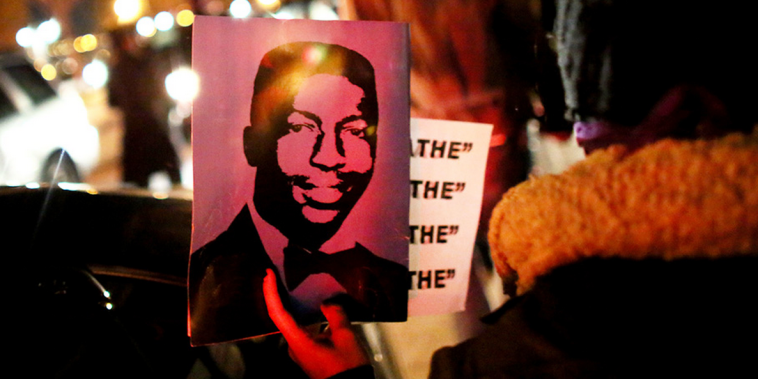In the days following a Staten Island grand jury’s decision to not indict the police officer (and his three associates) who killed Eric Garner in pursuit a few pennies of cigarette tax, outrage over the circumstances surrounding Garner’s death and the injustice of its consequences has been near universal. Libertarians, conservatives, and liberals alike have agreed that Garner should not have been killed, and that it is appalling—to say the least—that his killers have so far avoided so much as a public trial.
Videos By Rare
While commenters left and right have concurred that militarized, unchecked policing is a widespread and systemic problem in America, they have been less unanimous over what else led to this tragedy.
Did Garner, yet another black man dead at the hands of white cops, die because of institutional racism? Or was he the victim of bad laws, which over-criminalize harmless behavior to fill state coffers?
I suggest the answer to both of these questions is yes—and we ignore either of them at our peril.
Yes, racism was a factor in Eric Garner’s death
At an individual level, Daniel Pantaleo, the cop directly responsible for choking Garner, has been previously sued multiple times for race-related civil rights violations. In one case, which was settled earlier this year, he forced two black men to strip from the waist down, squat, and cough on a public street.
But the bigger picture isn’t about Pantaleo. It’s about the fact that it is objectively safer to live in America without fear of police violence if you are white. In New York City, where Garner was killed, police for years unfairly targeted minorities with their “Stop and Frisk” program, a policy of shaking people down without any real cause which was only recently halted.
Nationwide, black people—and especially young black men—are disproportionately more likely to be killed by police during an arrest attempt than white people are. Note that this isn’t about arrest rates; it’s about the fact that once the arrest is underway, even if you do not threaten the officers’ lives, you are significantly more likely to end up dead if you are black.
Obviously, white people are killed by police, too. Earlier this year, for example, two cops in California were cleared of all charges after they brutally beat an unarmed, mentally ill, homeless—and white—man to death on camera while he begged for mercy.
But still, it is no surprise that black people in particular feel that they are not safe in America, that they must guard their children against police brutality, that their lives are not equally valued by our legal system.
In a country where a 12-year-old black girl—an honor student who was helping her parents with a chore—can be arrested in her own front yard by police searching for a white prostitute, brutally beaten by the cops, and then repeatedly dragged to court on charges that she resisted arrest, these fears and concerns of the black community are more than justified. It is well past time those of us whose skin tone affords us a reasonable assumption of safe interactions with police took this institutional racism seriously.
Yes, bad laws were a factor in Eric Garner’s death
Did you know you probably should be in jail? By one legal expert’s estimate, as many as 70 percent of Americans have committed a crime which could land them in prison.
Of course, most of us have no idea we’re felons, because it’s impossible to keep track of the absurd complexity of our federal criminal law alone, which now lists more than 3,000 crimes. At any given point, you could well be doing something that logic and conscience suggest is perfectly harmless only to find out Uncle Sam disagrees.
Such was the case for Eric Garner. He was selling tax-free individual cigarettes, called “loosies,” which find an eager market in New York because of the state’s exorbitant (and ineffective and regressive) cigarette tax, the highest in the nation. He wasn’t hurting anyone, and his actions should not have been criminalized.
Because as Eric Garner’s death has demonstrated, when we criminalize something, we are saying that we are ultimately ok with the government killing people to make sure they don’t do it. Every “law requires enforcement; every act of enforcement includes the possibility of violence.” The more laws we have, the more we create the possibility of deaths like Eric Garner’s.
Here are Garner’s last words, recorded in the video of his killing:
Every time you see me, you want to mess with me. I’m tired of it. It stops today. […] I’m minding my business, officer, I’m minding my business. Please just leave me alone. I told you the last time, please just leave me alone. Please. Please, don’t touch me. Do not touch me. [garbled] I can’t breathe. I can’t breathe. I can’t breathe. I can’t breathe. I can’t breathe. I can’t breathe. I can’t breathe. I can’t breathe.
As Jesse Walker writes at Reason, “That’s the statement of a man who was being choked figuratively long before he was choked literally. He is asserting his dignity, and then he’s being killed for it…Eric Garner died because he decided to demand what should be the first right of any human being in a decent society: the right to peacefully live your life without being molested.”
Reductive explanations that ignore either of these factors don’t help
In the aftermath of this injustice, Americans right and left need each other’s perspectives. The right has for too long been unwilling to listen to well-justified perceptions of racism. The left misses a vital tool for remedying the abuses the black community suffers if it ignores calls to axe unnecessary laws.
Institutional racism was certainly at play in Garner’s demise. But without the institutional part, that racism would be much less powerful: When everything is illegal, police have every excuse to stop, molest, and even kill us.
So did Eric Garner die because of racism or bad laws? Yes.

